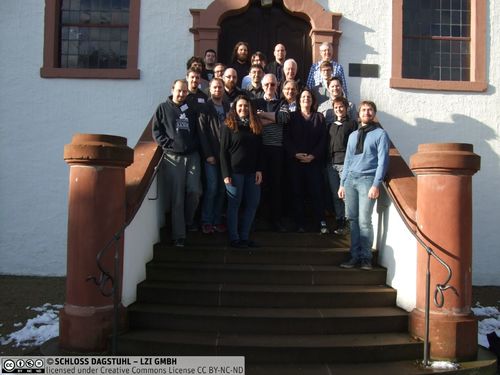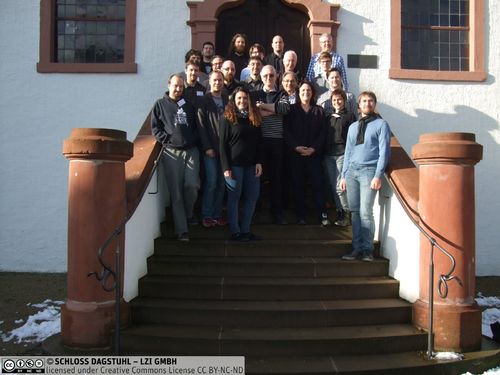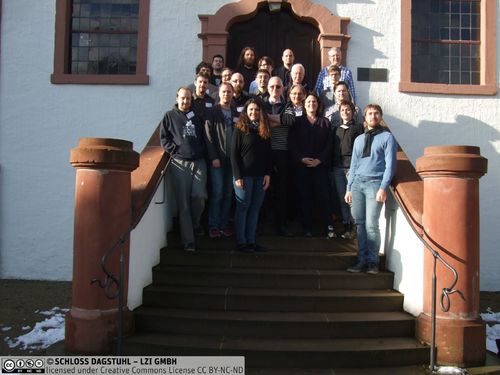Dagstuhl Seminar 15482
Social Concepts in Self-organising Systems
( Nov 22 – Nov 27, 2015 )
Permalink
Organizers
- Ada Diaconescu (Telecom Paris Tech, FR)
- Stephen Marsh (UOIT - Oshawa, CA)
- Jeremy Pitt (Imperial College London, GB)
- Wolfgang Reif (Universität Augsburg, DE)
Coordinator
- Jan-Philipp Steghöfer (Chalmers UT - Göteborg, SE)
Contact
- Susanne Bach-Bernhard (for administrative matters)
Schedule
This seminar aims to bring together computer scientists from different fields as well as non-technical researchers including sociologists, psychologists, and legal scholars to discuss the opportunities, limi- tations, impacts, and dangers of self-organising socio-technical systems that mimic social systems, interact with existing ones, or fundamentally influence human social interactions.
Self-organising systems are an active area of research with a vibrant community. Many application areas have been tackled, starting from routing of vehicles in traffic or packets in computer networks to swarm robotics and ambient assisted living and reaching to adaptive production systems, energy management, and resilient hardware. Such systems are composed of agents that form a structure within themselves as a reaction to stimuli from within the system and from its environment. These agents do not only interact with each other but also with the environment, external systems, and humans in order to fulfil overall system goals. Self-organisation treats structure as a degree of freedom in the system and thus provides benefits with regard to adaptivity, robustness, and resilience. There are two important aspects that will be considered in the seminar: how social concepts can be used to make self-organising systems more robust, more efficient, and more beneficial, and how self-organising technical systems interact with and influence existing social systems. The first aspect addresses open and heterogeneous systems in which agents compete and follow different individual goals that may overlap or compete with the overall system goal. In this context, different social concepts - such as trust and reputation, norms, forgiveness, social capital, and justice - their interplay, and their applicability to self-organising systems will be discussed. The second aspect aims to address the increasing dependence of society on computation and on complex artificial systems, their influence on human-computer interaction, and on inter-human interaction.
So far, researchers working on the topics outlined above have been spread across several research communities that broadly correspond to topical areas. Multi-agent systems, self-organising and self- adaptive systems, normative systems, and trust and reputation have been discussed in separate com- munities and venues. Sociologists, psychologists, and legal scholars have rarely been part of the discussion. The seminar brings together researchers from all these fields and areas and provides a plat- form for exchange and dissemination that has not been available before. The researchers dealing with specific social concepts contribute by providing their insight and expertise. They benefit by learning about the specialities and requirements of self-organising technical systems as well as of other, related social constructs. The researchers focused on self-organising systems contribute their domain knowledge and the understanding of the necessities of self-organising systems. They benefit by gaining a deeper understanding of computational social concepts, their application, and their limitations. An interesting and important impact of the seminar are potential insights into the kind of novel information systems - that rely on social concepts - that may be developed and introduced in current socio-technical systems in order to improve their self-organisation and potential for effective action. As societies already possess and implicitly utilise these social concepts as the core of their organisation, introducing technical systems that feature compatible social concepts seems essential to their successful integration within society.
We aim to have an even share of computer scientists and scientists from other fields to allow discussions on conceptual issues rather than on technical issues. Our goal is an open exchange of ideas, the sharing of knowledge, and establishing a mutual understanding of the state of the art in the respective fields of the attendant researchers.
Press Reviews
- The Next Generation of Socio-Technical Systems
Article in IEEE Technology and Society Magazine ( Volume: 36, Issue: 3, Sept. 2017 )
There are two exciting trends in computing that motivated this seminar. On the one hand, large-scale self-organising systems gain traction in real-world settings, e.g., in the autonomous control of the power grid or in personal transportation scenarios. On the other hand, our lives are more and more pervaded by socio-technical systems that rely on the interaction of existing, complex social systems and technical systems that in many ways mirror and form the social relationships of their users. The seminar brought together researchers from a variety of domains to discuss the technical, legal, and social issues these trends incur. One focus was how social concepts can be formalised and implemented to make technical self-organising systems more robust and efficient. The other focus was how technology shapes the social system and vice versa.
Use of Social Concepts in Self-Organising and Socio-Technical Systems
The seminar's first focus is motivated by the requirements of large-scale self-organising systems. The more such systems have to take their environment into account, the more open, and the more heterogeneous they are, the more important social concepts become [1]. If a population of agents is no longer developed, deployed, maintained, and controlled by a single company or institution, the goals of the agents no longer concur--especially, the individual sub-goals no longer necessarily imply the overall system goal. In such cases, social constructs can help encourage cooperation between the agents. The presence of norms as an explicit expression of acceptable behaviour [3], of a trust management system to encourage reciprocity [4], or of a form of computational justice to settle disputes within the system [5] are measures that have been discussed in the scientific community for these ends. In this way, the systems form a legal reality that establishes certain rules and regulations within the system. This legal reality must be in accordance with the legal system under whose jurisdiction these systems work.
The second focus is how technical systems interact with and influence existing social systems. With the increasing dependence of society on computation and on complex artificial systems, their influence on human-computer interaction, and on inter-human interaction becomes a topic of concern (see, e.g., [2]). One aspect of this is the novel challenge of managing an online identity, made necessary by the representations of human users in technical systems that are, necessarily, an abstraction of the real user. Another aspect is the increasing reliance of human users on these technical aids and the potential of negative effects on the users accompanied with this. Such effects can range from infringement of privacy, to withholding of relevant information, and even to targeted manipulation.
Results of the Seminar
The seminar was highly interactive, with a lot of time dedicated to plenum discussions. Talks were used as impulses to stimulate discussion and working groups focused on particular aspects that the participants deemed particularly important.
A number of talks addressed the implications of using social concepts in technical systems from different angles and featured insights into existing technical solutions, e.g., for computational justice, trust, and ethical behaviour, as well as the observable effects of these solutions. Likewise, incentives and how social constructs influence them was a recurring theme. The discussions following these talks addressed important issues such as the relationship between system and user values, goals and the rules designed to achieve these goals, possible attacks on socio-technical systems, quantifiable incentives, and self-determination in technical systems.
A different set of talks was aimed at understanding the way social systems and technology interact, e.g., how the social organisation of the human users is represented in the technical system and becomes evident in the interactions in that system. An overview of the interplay of legal and technical systems was also provided, with important insights into the connection between technical feasibility and legal admissibility. This set of talks encouraged discussion geared towards governance, power, and the representation of values in technical systems, as well as on how to represent existing social systems in technical systems and how both the social system and its representation evolve over time.
Based on the discussions and the input from the talks, three working groups were formed that focused on discussing different aspects of the use of social concepts in self-organising systems. Their main aims and contributions are as follows:
Understanding: A first step was to consider what the notion of "social" means in the context of the technical systems regarded in the seminar. Based on a brief literature survey, the working group determined that social means that an organisation exists, that the welfare of the individuals and the organisation is regarded, and that the relations between individuals and between individuals and the organisation are a concern. A second step was to stipulate that formalising social values leads to the individuals behaving in a way that recognises their social obligations and responsibilities. Finally, the notion of ``socially-sensitive design'' was introduced to denote that both the design process and the system itself must be socially sensitive.
Engineering: The main concerns were how to make different social concepts usable in technical systems, how to select the fitting social construct for a specific problem, how to measure its effectiveness, and how to combine several social concepts. The working group suggested a pattern language to express selection criteria, implementation approaches, and consequences, as well as a set of metrics that make it possible to evaluate the impact of the social concept in the technical system.
Dynamics: The discussion developed towards how the social and technical components of socio-technical systems interact with each other and how the resulting dynamic aspects influence these systems. A total of six challenges were identified, the most important of which pertains to how the interaction between different social concepts that provides "checks and balances" in social systems can be transferred to technical systems. Further problems that were discussed are conflict resolution and power distribution, as well as the influence of technical systems on society and where the responsibility for this influence lies.
Future Work
The seminar participants agreed that the topic is timely and relevant and that there are a number of open issues that need to be addressed in the future. Possible venues for future elaboration of these issues are the SASO^ST workshops, held annually at the IEEE Conference on Self-Adaptive and Self-Organising Systems, as well as a number of other projects currently in discussion. In particular, the organisers are discussing ways to provide an overview of the state of the art of the field as well as a research roadmap and opportunities to specifically discuss the impact self-organising and socio-technical systems will have on society.
References
- L. Vercouter and G. Muller. L.i.a.r.: Achieving social control in open and decentralized multiagent systems. Applied Artificial Intelligence, 24(8):723–768, 2010.
- J. Botev. Anonymity, immediacy and electoral delegation in socio-technical networked computer systems. In M. Horbach, editor, Informatik 2013, 43. Jahrestagung der Gesellschaft für Informatik e.V. (GI), Informatik angepasst an Mensch, Organisation und Umwelt, 16.-20. September 2013, Koblenz, volume 220 of LNI, page 1164. GI, 2013.
- T. Balke, C. da Costa Pereira, F. Dignum, E. Lorini, A. Rotolo, W. Vasconcelos, and S. Villata. Norms in MAS: Definitions and related concepts. In G. Andrighetto, G. Governatori, P. Noriega, and L. van der Torre, editors, Normative Multi-Agent Systems, volume 4 of Dagstuhl Follow-Ups, pages 1–31. Schloss Dagstuhl – Leibniz-Zentrum für Informatik, 2013.
- L. Mui, M. Mohtashemi, and A. Halberstadt. A computational model of trust and reputation. In Proc. of the 35th Hawaii International Conference on System Sciences (HICSS’02), pages 188–196. IEEE Computer Society Press, 2002.
- J. Pitt, D. Busquets, and R. Riveret. Formal models of social processes: The pursuit of computational justice in self-organising multi-agent systems. In 7th IEEE International Conference on Self-Adaptive and Self-Organizing Systems, SASO 2013, Philadelphia, PA, USA, September 9-13, 2013, pages 269–270. IEEE, 2013.
 Jan-Philip Steghöfer and Ada Diaconescu and Stephen Marsh and Jeremy Pitt and Wolfgang Reif
Jan-Philip Steghöfer and Ada Diaconescu and Stephen Marsh and Jeremy Pitt and Wolfgang Reif
- Gerrit Anders (Universität Augsburg, DE) [dblp]
- Kirstie Bellman (Topcy House Consulting, US) [dblp]
- Nelly Bencomo (Aston University - Birmingham, GB) [dblp]
- Olivier Boissier (Ecole des Mines - St. Etienne, FR) [dblp]
- Jean Botev (University of Luxembourg, LU) [dblp]
- Pompeu Casanovas (Autonomus University of Barcelona, ES) [dblp]
- Ada Diaconescu (Telecom Paris Tech, FR) [dblp]
- Babak Esfandiari (Carleton University - Ottawa, CA) [dblp]
- Sebastian Götz (TU Dresden, DE) [dblp]
- Hanno Hildmann (NEC Laboratories Europe - Heidelberg, DE) [dblp]
- Jan Kantert (Leibniz Universität Hannover, DE) [dblp]
- Peter R. Lewis (Aston University - Birmingham, GB) [dblp]
- Stephen Marsh (UOIT - Oshawa, CA) [dblp]
- Christian Müller-Schloer (Leibniz Universität Hannover, DE) [dblp]
- Gauthier Picard (Ecole des Mines - St. Etienne, FR) [dblp]
- Jeremy Pitt (Imperial College London, GB) [dblp]
- Wolfgang Reif (Universität Augsburg, DE) [dblp]
- Ingo Scholtes (ETH Zürich, CH) [dblp]
- Jan-Philipp Steghöfer (Chalmers UT - Göteborg, SE) [dblp]
- Sven Tomforde (Universität Augsburg, DE) [dblp]
- Leon van der Torre (University of Luxembourg, LU) [dblp]
- Laurent Vercouter (INSA - St- Etienne-du-Rouvray, FR) [dblp]
Classification
- artificial intelligence / robotics
- society / human-computer interaction
- soft computing / evolutionary algorithms
Keywords
- Organic Computing
- Socio-technical Systems
- Sociologically-inspired Computing
- Multi-Agent Sytems
- Trust
- Reputation
- Social Capital
- Computational Justice
- Norms
- Self-Organisation




 Creative Commons BY 3.0 Unported license
Creative Commons BY 3.0 Unported license
